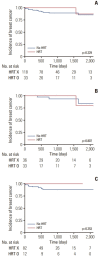Short-term Impact of Hormone Replacement Therapy on Risk of Breast Cancer in BRCA Mutation Carriers: A Nationwide Study in South Korea
- PMID: 37591780
- PMCID: PMC10789953
- DOI: 10.4143/crt.2023.653
Short-term Impact of Hormone Replacement Therapy on Risk of Breast Cancer in BRCA Mutation Carriers: A Nationwide Study in South Korea
Abstract
Purpose: BRCA1/2 mutations are well-known risk factors for breast and ovarian cancers in women. Risk-reducing salpingo-oophorectomy (RRSO) is the standard treatment for preventing ovarian cancer with BRCA mutations. Postmenopausal syndrome (symptoms after RRSO can be alleviated by hormone replacement therapy (HRT); however, the use of HRT in carriers of BRCA mutations has been controversial because of the concern that HRT increases the risk of breast cancer. This study aimed to evaluate the effects of HRT in BRCA mutation carriers who underwent RRSO.
Materials and methods: A total of 151 carriers, who underwent RRSO between 2013 and 2020 after the diagnosis of BRCA1 or BRCA2 mutations were selected and followed up for a median of 3.03 years. Patients were divided into two groups: those who received HRT after RRSO (n=33) and those who did not (n=118). We compared the incidence of breast cancer over time between these two groups.
Results: There was no significant difference in the incidence of breast cancer between women who received HRT and those who did not (p=0.229). Multivariate logistic regression analysis, adjusted for age and parity revealed no significant difference in the risk of breast cancer between these two groups (hazard ratio, 0.312; 95% confidence interval, 0.039 to 2.480; p=0.278).
Conclusion: In this study, we found no relationship between post-RRSO HRT and breast cancer in the population with BRCA mutations. Therefore, healthcare providers may consider the alleviation of symptoms of postmenopausal syndrome through HRT in patients who underwent RRSO.
Keywords: BRCA1; BRCA2; Breast neoplasms; Female; Genes; Germ-line mutation; Hormone replacement therapy.
Conflict of interest statement
Conflict of interest relevant to this article was not reported.
Figures


Similar articles
-
Use of total abdominal hysterectomy and hormone replacement therapy in BRCA1 and BRCA2 mutation carriers undergoing risk-reducing salpingo-oophorectomy.Fam Cancer. 2009;8(1):23-8. doi: 10.1007/s10689-008-9208-6. Epub 2008 Aug 29. Fam Cancer. 2009. PMID: 18758995
-
Breast cancer risk and hormone replacement therapy among BRCA carriers after risk-reducing salpingo-oophorectomy.Eur J Cancer. 2021 May;148:95-102. doi: 10.1016/j.ejca.2021.02.007. Epub 2021 Mar 17. Eur J Cancer. 2021. PMID: 33743487
-
Hormone replacement therapy after risk reducing salpingo-oophorectomy in patients with BRCA1 or BRCA2 mutations; a systematic review of risks and benefits.Gynecol Oncol. 2019 Apr;153(1):192-200. doi: 10.1016/j.ygyno.2018.12.014. Epub 2019 Jan 17. Gynecol Oncol. 2019. PMID: 30661763
-
The Role of Hormonal Replacement Therapy in BRCA Mutated Patients: Lights and Shadows.Int J Mol Sci. 2023 Jan 1;24(1):764. doi: 10.3390/ijms24010764. Int J Mol Sci. 2023. PMID: 36614207 Free PMC article. Review.
-
Hormone replacement therapy after prophylactic risk-reducing salpingo-oophorectomy and breast cancer risk in BRCA1 and BRCA2 mutation carriers: A meta-analysis.Crit Rev Oncol Hematol. 2018 Dec;132:111-115. doi: 10.1016/j.critrevonc.2018.09.018. Epub 2018 Oct 3. Crit Rev Oncol Hematol. 2018. PMID: 30447915 Review.
Cited by
-
A contemporary review of breast cancer risk factors and the role of artificial intelligence.Front Oncol. 2024 Apr 18;14:1356014. doi: 10.3389/fonc.2024.1356014. eCollection 2024. Front Oncol. 2024. PMID: 38699635 Free PMC article. Review.
References
-
- Miki Y, Swensen J, Shattuck-Eidens D, Futreal PA, Harshman K, Tavtigian S, et al. A strong candidate for the breast and ovarian cancer susceptibility gene BRCA1. Science. 1994;266:66–71. - PubMed
-
- Ford D, Easton DF, Bishop DT, Narod SA, Goldgar DE. Risks of cancer in BRCA1-mutation carriers. Breast Cancer Linkage Consortium. Lancet. 1994;343:692–5. - PubMed
-
- Daly MB, Pilarski R, Berry M, Buys SS, Farmer M, Friedman S, et al. NCCN guidelines insights: genetic/familial high-risk assessment: breast and ovarian, version 2.2017. J Natl Compr Canc Netw. 2017;15:9–20. - PubMed
-
- Gallicchio L, Whiteman MK, Tomic D, Miller KP, Langenberg P, Flaws JA. Type of menopause, patterns of hormone therapy use, and hot flashes. Fertil Steril. 2006;85:1432–40. - PubMed
-
- Madalinska JB, Hollenstein J, Bleiker E, van Beurden M, Valdimarsdottir HB, Massuger LF, et al. Quality-of-life effects of prophylactic salpingo-oophorectomy versus gynecologic screening among women at increased risk of hereditary ovarian cancer. J Clin Oncol. 2005;23:6890–8. - PubMed
MeSH terms
Substances
LinkOut - more resources
Full Text Sources
Medical
Miscellaneous

